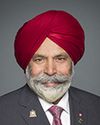I am now prepared to rule on the question of privilege raised on April 8, 2019, by the hon. member for Victoria concerning a leak involving the appointment process for the Supreme Court.
When raising his question of privilege, the member for Victoria asserted that his reputation as a member has been damaged as a result of speculation around the source of a leak of personal information of a prospective member of the Supreme Court. In particular, he felt that both he and the member for Niagara Falls are now under a cloud of suspicion, having been involved in the process initiated by the government of recommendations for Supreme Court nominees. Consequently, he argued that this suspicion, until resolved, has resulted in a direct impact on his privileges. He also contended that the leak has shown a distinct contempt of Parliament.
As referred to at page 22 of the third edition of House of Commons Procedure and Practice, the practice of an ad hoc committee of parliamentarians to review nominees for the Supreme Court is not new. Successive governments have used this mechanism to help them fulfill their duties. While composed of some parliamentarians, it is not a parliamentary committee but more of an advisory body to the government as part of the exercise of its prerogative power of appointment.
The issue raised then is one that concerns government and the way it reaches its decisions, an area over which the Chair has no authority. My predecessor reminded members of this on May 12, 2014, at page 5520 of the Debates, when he stated:
...it is not within the Speaker's authority to adjudicate on government policies or processes...the distinction between governmental procedures and House procedures remains and must be acknowledged.
On November 22, 2016, I reiterated this fundamental distinction when I stated at page 7084 of the Debates:
...when members request redress with respect to rules external to the House, as Speaker I can neither interpret nor enforce them. It has long been the case that the Speaker's role is limited to ensuring that the body of rules and practices that the House has adopted are respected and upheld.
As such, it is not for the Speaker to investigate or pass judgment on rules, events or actions external to the House, including the leak of information in question. Moreover, as the hon. member acknowledged, this incident is being investigated by the Privacy Commissioner of Canada, a parliamentary agent who reports to this House.
That being said, damaging a member’s reputation is a serious matter if it can be proven that their ability to perform their parliamentary functions has been impeded. House of Commons Procedure and Practice, third edition, states at page 112:
The unjust damaging of a Member’s good name might be seen as constituting an obstruction if the Member is prevented from performing his or her parliamentary functions.
It is incumbent upon members to demonstrate to the Chair exactly how they were hindered in the performance of their parliamentary duties. The hon. member has contended that the cloud of suspicion has damaged his reputation as well as that of the hon. member for Niagara Falls, but he has not explained in what way it has actually obstructed him.
Finally, the member for Victoria claimed that the leak constituted a contempt of Parliament. Although members of Parliament were part of the government's advisory group, it is hard to see how a leak from any non-parliamentary body can be a contempt of Parliament. Again, the member has not provided enough information for me to understand how a contempt against Parliament has been committed.
As the member for Victoria has not clearly demonstrated to the Chair how he has been impeded in fulfilling his parliamentary functions, I cannot find that this constitutes a prima facie question of privilege or of contempt of the House.
As an aside, I do not suppose it will help if I indicate my own very high regard of the hon. members for Victoria and Niagara Falls.
I thank all hon. members for their attention.













